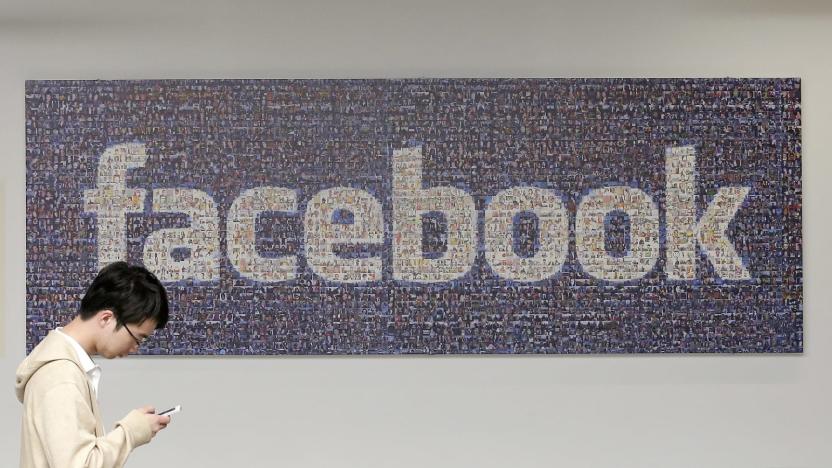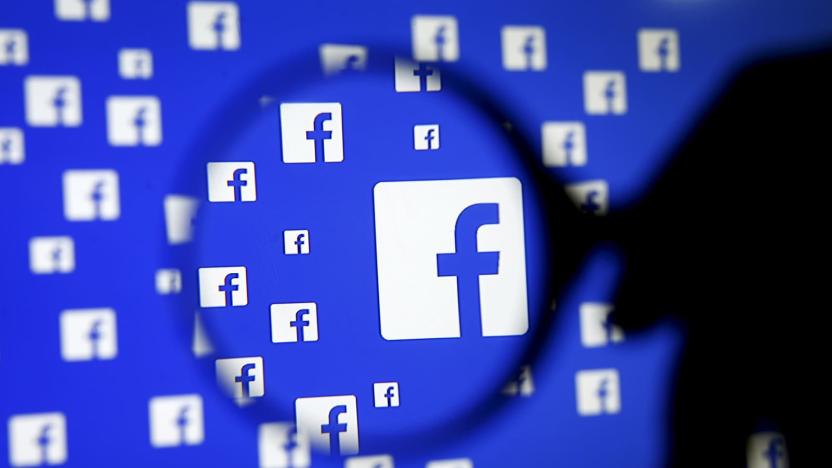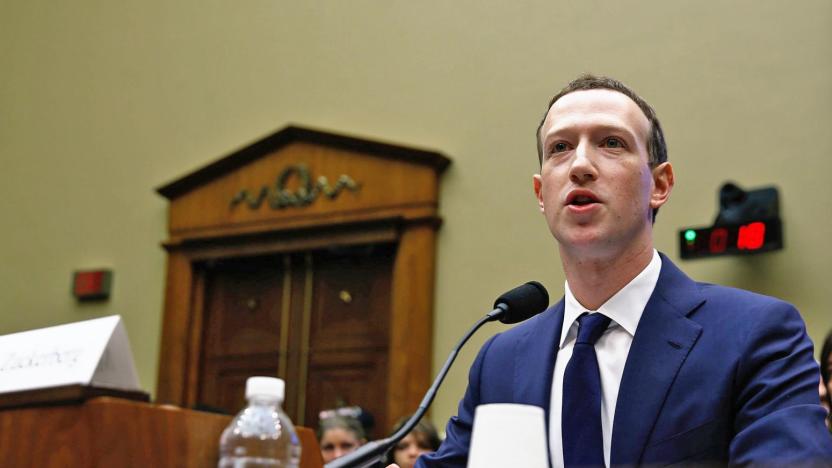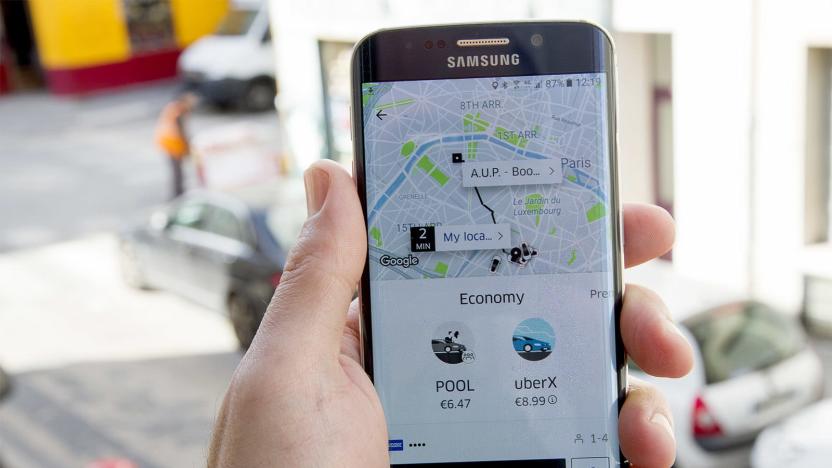userdata
Latest

Facebook will be liable for future Cambridge Analytica-style scandals
Facebook is updating its terms and conditions after agreeing several changes with the EU. It will have to clearly explain to users they can access the social network for free because it uses targeted ads that rely on user data. Facebook will also have to disclose what revenues it generates through the use of such data.

Several states are investigating Facebook for mishandling user data
Already the subject of a number of federal probes, Facebook is also the target of investigations being conducted at the state level, according to Bloomberg. The Attorneys General for Connecticut, Illinois, Massachusetts, New York, New Jersey and North Carolina are all involved in ongoing efforts scrutinizing how Facebook handles user data. The investigations were primarily triggered by the revelation of the Cambridge Analytica scandal.

Facebook bug let apps access unposted photos for millions of users
Facebook has disclosed yet another privacy flub. This time around, it says a bug in the Photo API led to third-party apps being able to access not only timeline photos (which users had permitted them to do), but Stories, Marketplace images and photos people uploaded to Facebook but never actually shared.

Mark Zuckerberg dismissed the risks of sharing user data
As Facebook continues to face scrutiny over its privacy practices following the Cambridge Analytica debacle, ongoing investigations into the company are giving us a look at what kind of access Facebook gave other companies to its user data as well as the discussions surrounding those decisions. The UK's Digital, Culture, Media and Sport Committee just released a slew of internal documents regarding Facebook's handling of user data, some of which reveal that the company granted certain companies -- such as Airbnb, Lyft and Netflix -- special access to that data. But those documents also show that CEO Mark Zuckerberg didn't see a scandal like Cambridge Analytica coming.

Facebook gave Lyft and others special access to user data
Since the Cambridge Analytica revelations came to light earlier this year, there's been quite a bit of scrutiny on what companies Facebook has given user data to. And now, documents released by the UK's Digital, Culture, Media and Sport Committee, which is investigating Facebook, show how the company gave certain companies special access to user data. Among those receiving favored access were Airbnb, Lyft, Netflix and Bumble, while the documents show that Facebook also pointedly denied data access to some competitors, like Vine.

Senator Wyden wants to jail execs who don't protect consumer data
Sen. Ron Wyden (D-OR) released a draft the Consumer Data Protection Act, which would create new protections for consumer information and strict punishments for those found to be abusing user data. The proposed bill would send senior executives to jail for 10 to 20 years if they fail to follow the guidelines for data use.

Facebook says Cambridge Analytica may not have accessed EU user data
Even after Cambridge Analytica shut down in early May, Facebook is still answering questions about the data it did (or didn't) hand over to the firm. At a hearing with European Union lawmakers today, two executives from the social media titan said that to the best of their knowledge, no EU user's information had been shared with Cambridge Analytica.

Apple limits how apps can handle and share users' contact lists
Apple updated its app guidelines last week, and while the biggest news was a widespread ban on cryptocurrency mining, the company also tightened its grip on what developers can and can't do with user info. Specifically, it restricted apps' abilities to collect, harness and share anyone's contact information.

Facebook reportedly sold user data to businesses in secret deals
Contrary to Facebook's claims that it cut off developer access to its user data back in 2015, the Wall Street Journal has discovered that the company has allowed certain third party companies to retain the practice. These deals, known as "whitelists," enable other companies to see user's friend lists, including the person's phone number as well as a metric that measures the user's "closeness" to their online contacts. RBC Capital Markets and Nissan Motors are just a few of the third parties named by the WSJ's unnamed FB source.

Facebook will let users see which sites are tracking them
Facebook is kicking off its F8 conference by heading off everyone's most pertinent question: What is the platform doing to address user data concerns? The answer, it seems, is Clear History, a new feature the social network is building to give users more control over the information it collects from your browsing history.

OnePlus is collecting your private data without permission
OnePlus is mainly known as the little upstart that took on the big guns with the help of its solid, yet affordable, handsets. But, its in-house version of Android, dubbed OxygenOS, is once again threatening to dent its hard-fought for credibility. The problem lies with the company's approach to data-sharing, which is problematic (to say the least). As security researcher Chris Moore has repeatedly pointed out, the manufacturer's OxygenOS-based devices not only gather a ton of user data, but they also tie this info to individual devices, and user accounts in particular.

Uber puts you in control of your user data
Uber is making removing the hurdles to deleting your account entirely. Like so many other services, simply uninstalling the app from your phone doesn't wipe your data on the company's servers. Not any more, according to The Verge. Rather than having to contact Uber support to eliminate your personal information, a forthcoming update adds the feature to the app itself. From the privacy settings you'll apparently be able to start a 30-day countdown, and after the clock hits zero your customer data will go the way of the dodo.

Amazon accused of handing out its users' personal data
Eric Springer is not happy, mostly because he believes that Amazon let a nefarious type get at his account. In a blog over at Medium, Springer revealed that he was the victim of a "social engineering" hack that exposed his details to an unnamed third party. With just a rough idea of Springer's location and his email address, the attacker tricked a customer services rep to give up almost all of his personal information. The attacker was subsequently able to use this data to trick Springer's bank into sending out a copy of his credit card.

LinkedIn's making it harder to download your account data
Sometimes things are way harder than they should be. If you're a LinkedIn user, the networking site is now making it more difficult to download your contact list and other personal information. Instead of being an instant process, as is the case with Facebook or Google's products, LinkedIn (quietly) announced you'll have to wait up to three days to get that data from its service. The change, which took effect yesterday, also applies to additional account info -- like your LinkedIn updates, daily activity, IP records and searches. So plan ahead, folks, because you're going to be waiting and waiting.

Facebook to join Twitter in providing TV networks with user data
Now that Facebook has granted broadcasters access to your public wall posts, it wants to give them even more of your data -- but anonymously this time. Zuckerberg and Co. told the Wall Street Journal it'll supply the likes of ABC, NBC, FOX and others with detailed analytics on how much buzz a show is generating in terms of likes, comments and shares. It'll mine that info from private postings as well public ones, though it said that the data will be aggregated without revealing anyone's identity. Of course, Twitter and Nielsen have been supplying networks with such info for a while now, but Facebook claims its results are more meaningful, since viewers must ostensibly use their real identities. One CBS exec added that Facebook's wider demographic also seemed to jibe better with actual audience numbers, meaning that programming could become less affected by tech-savvy types and more by your mom.

AT&T updates privacy policy, may begin sharing anonymous user data
In an update on its Public Policy Blog, AT&T disclosed that it may begin selling anonymous user data to retailers and marketers, with the end goal being "to deliver more relevant advertising to... customers." The carrier is far from the first to sell aggregate information -- here's looking at you, Verizon -- but the provider is unique in combining data on TV, WiFi and wireless usage. The company said it could also provide aggregate info about users' app usage and U-Verse info. Also notable in the new privacy policy: AT&T notes that it could sell information about individual users, with the stipulation that the data would still be kept anonymous, and media research companies would only be able to use that info in aggregate reports. While this is hardly a case of AT&T pushing new privacy boundaries, users can opt out of the program (see the second source link below).

Reddit's reworked privacy policy clarifies data handling, comes into effect May 15th
The online Aladdin's cave and AMA forum Reddit has revealed a revamped privacy policy intended to make clear exactly how it deals with users' data. Legalese is notably absent, with credit for that going to Lauren Gelman, a legal consultant who's previously worked with the likes of the EFF -- a member, like Reddit, of the Internet Defense League. Essentially, the new policy is geared towards allowing "your participation to remain as anonymous as you choose," with the website stating that any of your data won't be shared without consent, unless the law requires it. Even then, you will be notified, with the only exception being a court order that prevents it. Reddit also notes that deleting your account will remove your username from posts and comments, but they will remain on the site. As only the last edit performed stays on the servers, however, you could trek back through your history and strip everything out to finalize your departure. There's much more in the announcement post and full policy document over at the source links, in case you wanna have a read before it all kicks in on May 15th.

New BBC iPlayer stats chart the rise of 'connected' TV viewing
Thanks to widespread adoption and excellent cross-platform availability, the BBC's ubiquitous iPlayer is the perfect gauge of online viewing habits. New usage figures for December throw up little in the way of surprises, but still make impressive reading. The good old computer remains tops-of-the-client-pops for Brits, but smart TVs are taking a bigger slice of the (187 million) total requests, 7 million in fact -- a 1,000% year-on-year increase. More mobile telly-addicts saw smartphone and tablet views rise to thirteen million and ten million respectively, a growth of 163 and 596 percent. With 2012 offering ever more top gear and phones to chose from, we're expecting this trend to continue for some time yet. Square-eye stat-fans can hit up the source for the full breakdown. Hint: lots of Eastenders.

Yahoo to retain search data for 18 months, says it's in your best interest
We've heard this one before: a seemingly well intentioned corporation makes promises to uphold user anonymity, but when market pressure proves too much to handle, it's left to weigh the benefits of privacy over profit. Well, it looks like Yahoo's not immune to such goings on, as it's just announced that it will renege on its previous data retention promises and hold on to raw search data for 18 months. That's a pretty significant change, as the previous policy boasted data retention limits of only 90 days. If you ask Yahoo, though, it's just good business. In a post to its policy blog, Anne Toth said "we will keep our log file data longer than we have been – offering consumers a more robust individualized experience – while we continue our innovation in the areas of transparency and choice to protect privacy." We suspect "more robust individualized experience" actually means more aggressive targeted ads, but we'll just have to wait and see. The new policy goes into effect this July.

WSJ: Google 'agonizing' over user privacy, 'vision document' suggests selling data
It was just last week that the Wall Street Journal reported Microsoft's decision to limit private browsing in IE8 as part of its ongoing series on online privacy, and today the focus is on Google, which is said be "agonizing" over the balance between user privacy and advertising opportunities. It's a long piece that you should read in full, but essentially the WSJ claims that Larry Page and Sergey Brin have gone from strictly forbidding any efforts to track users online to a more subtle interpretation of their famous "don't be evil" motto which allows them to leverage user data and sell finely targeted ads without "exploiting customers." According to the WSJ, the change in attitude came with the rise of upstart ad firms that lacked Google's scruples and the search giant's purchase of DoubleClick, which led to Google's first use of cookies. What's more, once at Google, former DoubleClick exec Aitan Weinberg produced a seven-page "vision document" that outlined several strategies to profit from user data, ranging from building a "trading platform" for user data to allowing users to pay directly and get rid of ads all together. (Google says the document was for "brainstorming" and that some of the proposals are "complete non-starters.") The WSJ also says Google's working hard on that rumored social networking service to go head-to-head with Facebook, complete with a "like" button it can put across the web to build an even better profile of your likes and dislikes, and that the company is considering mixing user data from across services like Gmail and Google Checkout to make those profiles even deeper, all while trying to balance privacy, security, and legal interests. This balance appears to be causing significant tension between everyone at Google, Larry and Sergey included: the WSJ says the two founders have had shouting matches over things like selling "interest-based" ads, and that Sergey has been more reluctant than Larry to take advantage of user data. Like we said, it's a good read, so hit the source link and get to it.













